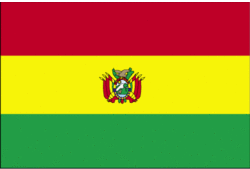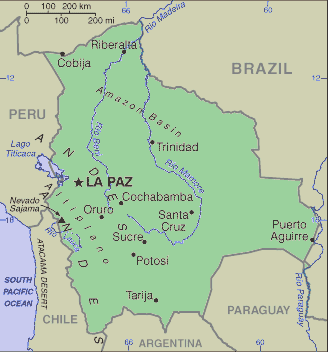Traveling Luck for Bolivia. Bolivia, South America
Bolivia is located in Central South America, southwest of Brazil.
Land in Bolivia is rugged Andes Mountains with a highland plateau (Altiplano), hills, lowland plains of the Amazon Basin.
Bolivian land covers an area of 1098580 square kilometers which is slightly less than three times the size of Montana
Bolivia has borders with Argentina for 832km, Brazil for 3400km, Chile for 861km, Peru for 900km and Paraguay for 750km.
 Bolivian national flag (Flag of Bolivia)
Bolivian national flag (Flag of Bolivia)
As for the Bolivian climate; varies with altitude; humid and tropical to cold and semiarid.
Bolivian(s) speak Spanish (official), Quechua (official), Aymara (official).
Places of note in Bolivia
- Santa Cruz de la Sierra
- Cochabamba
- La Paz
- Sucre
- Oruro
- Tarija
- Potosí
- Montero
- Trinidad
- Yacuiba
- Riberalta
- Guayaramerín
- Villazón
- Llallagua
- Camiri
- Cobija
- San Ignacio de Velasco
- Tupiza
- Warnes
- San Borja
- Villamontes
- Cotoca
- Villa Yapacaní
- Santiago del Torno
- Huanuni
- Punata
- Ascensión
- Mineros
- Patacamaya
- Rurrenabaque
- Portachuelo
- Puerto Quijarro
- Uyuni
- Roboré
- Pailón
 Bolivian map
Bolivian map
Regions of Bolivia
Bolivia, named after independence fighter Simon BOLIVAR, broke away from Spanish rule in 1825; much of its subsequent history has consisted of a series of nearly 200 coups and countercoups. Comparatively democratic civilian rule was established in 1982, but leaders have faced difficult problems of deep-seated poverty, social unrest, and illegal drug production. In December 2005, Bolivians elected Movement Toward Socialism leader Evo MORALES president - by the widest margin of any leader since the restoration of civilian rule in 1982 - after he ran on a promise to change the country's traditional political class and empower the nation's poor majority.
Bolivia, long one of the poorest and least developed Latin American countries, reformed its economy after suffering a disastrous economic crisis in the early 1980s. The reforms spurred real GDP growth, which averaged 4% in the 1990s, and poverty rates fell. Economic growth, however, lagged again beginning in 1999 because of a global slowdown and homegrown factors such as political turmoil, civil unrest, and soaring fiscal deficits, all of which hurt investor confidence. In 2003, violent protests against the pro-foreign investment economic policies of President SANCHEZ DE LOZADA led to his resignation and the cancellation of plans to export Bolivia's newly discovered natural gas reserves to large northern hemisphere markets. In 2005, the government passed a controversial natural gas law that imposes on the oil and gas firms significantly higher taxes as well as new contracts that give the state control of their operations. Bolivian officials are in the process of implementing the law; meanwhile, foreign investors have stopped investing and have taken the first legal steps to secure their investments. Real GDP growth in 2003-05 - helped by increased demand for natural gas in neighboring Brazil - was positive, but still below the levels seen during the 1990s. Bolivia's fiscal position has improved in recent years, but the country remains dependent on foreign aid from multilateral lenders and foreign governments to meet budget shortfalls. In 2005, the G8 announced a $2 billion debt-forgiveness plan over the next few decades that should help reduce some fiscal pressures on the government in the near term.
Bolivian natural resources include tin, natural gas, petroleum, zinc, tungsten, antimony, silver, iron, lead, gold, timber, hydropower
landlocked; shares control of Lago Titicaca, world's highest navigable lake (elevation 3,805 m), with Peru
Bolivian religion is Roman Catholic 95%, Protestant (Evangelical Methodist) 5%.
Natural hazards in Bolivia include flooding in the northeast (March-April).
Travel Advice for Bolivia
BoliviaSUMMARY
- The threat from terrorism is low. But you should be aware of the global risk of indiscriminate terrorist attacks, which could be against civilian targets, including places frequented by foreigners.
- In early January 2007, Bolivia experienced a period of civil unrest in some of the major cities. There is continual risk of public protests and strikes throughout Bolivia. The tension has now decreased considerably, but you should continue to exercise caution. See the Local Travel section of this Travel Advice for more details.
- Many roads are currently being flooded as a result of seasonal heavy rains, although the authorities are trying to open them again as quickly as possible. The main roads into Santa Cruz are particularly affected at present.
- Air travel within Bolivia and international flights may be disrupted as a result of shortage of jet fuel.
- There has been an outbreak of dengue fever in the regions of Santa Cruz and Beni in January 2007. There have been a number of cases of Yellow Fever in the Yungas (La Paz department) and in the Chapare (Cochabamba department). You should ensure you have a valid Yellow Fever vaccination certificate before travelling to these areas. Some areas of Bolivia are malarial. See Health section below for more details.
- Be aware of the dangers of altitude sickness.
- There is a risk of “express kidnappings”. You should exercise caution when arriving in, and travelling around, Bolivia and be aware of the general risks of crime for visitors. See Crime section below for more details.
- You should register with the British Embassy in La Paz, so that you can be contacted in an emergency.
- The main type of incident for which British nationals require consular assistance in Bolivia is theft of money, bankcards and passports. You should carry photocopies of your passport and ensure that the original document is kept in a safe place.
- The British Embassy in La Paz can only issue Temporary Passports (TP) to those British nationals who have lost or had their passport stolen and require an urgent replacement. See General section for more details.
- We strongly recommend that you obtain comprehensive travel and medical insurance before travelling. You should check any exclusions, and that your policy covers you for the activities you want to undertake. Please see: Travel Insurance.
SAFETY AND SECURITY
You should be vigilant and cautious about your surroundings on arrival and whilst travelling in Bolivia because of the number of violent crimes against foreign nationals, including British visitors. You should exercise caution when choosing which type of transport to travel in. Look out for established transport companies and ask widely for guidance – you should avoid people offering cheaper transport, particularly, but not exclusively, at the popular overland Copacabana crossing point from Peru. This has been a regular starting point of violent, and sometimes life-threatening, attacks and abductions.
Political Situation
Bolivia Country Profile.
Access to airports can sometimes be difficult during times of significant protest. You should maintain contact with your airline/tour operator before travelling, and in country you should monitor local media reports for up to date information.
Traffic is usually light, both on the main highways and unpaved roads. But there is little control of vehicle road-worthiness and serious accidents do occur on the main tourist routes. Some of Bolivia’s principal roads are paved, but of variable quality. Most roads are unpaved rough tracks, which are graded from time to time. 4-wheel drive vehicles are often the best means of transport, especially during the rainy season, which can make roads completely impassable for days. Broken-down vehicles with no warning lights are a frequent hazard on roads at night. In the main cities, taxis are plentiful and cheap (but see Crime section above relating to bogus taxi drivers). But many taxis do not meet European standards and rarely have seat belts. Hire cars are available, but you will need an international driving licence.
You can take boat trips on Lake Titicaca but you should be aware that the craft are often very basic.
LOCAL LAWS AND CUSTOMS
ENTRY REQUIREMENTS
HEALTH
GENERAL
Money

 Search
Search Bolivia country profile
Bolivia country profile Travel advice for Bolivia
Travel advice for Bolivia